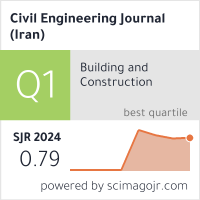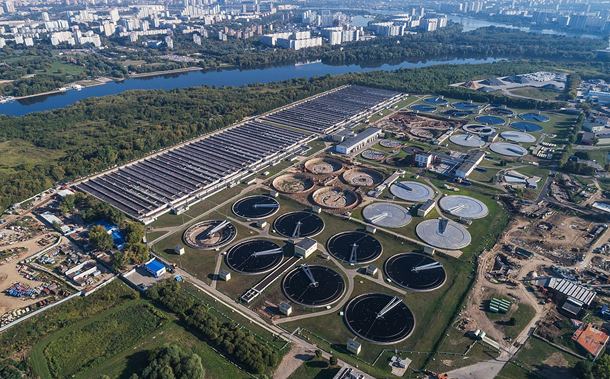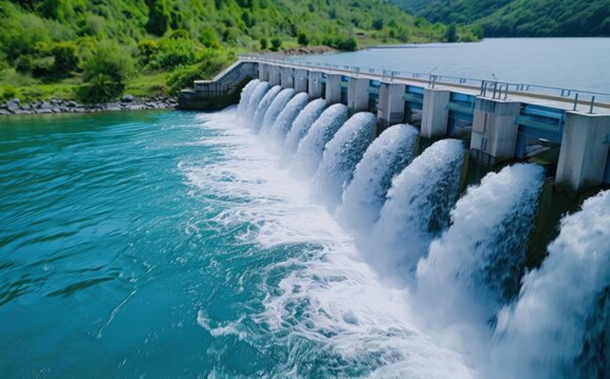Sacrificial Piles as Scour Countermeasures in River Bridges A Numerical Study using FLOW-3D
Downloads
Scour is defined as the erosive action of flowing water, as well as the excavating and carrying away materials from beds and banks of streams, and from the vicinity of bridge foundations, which is one of the main causes of river bridge failures. In the present study, implementing a numerical approach, and using the FLOW-3D model that works based on the finite volume method (FVM), the applicability of using sacrificial piles in different configurations in front of a bridge pier as countermeasures against scouring is investigated. In this regard, the numerical model was calibrated based on an experimental study on scouring around an unprotected circular river bridge pier. In simulations, the bridge pier and sacrificial piles were circular, and the riverbed was sandy. In all scenarios, the flow rate was constant and equal to 45 L/s. Furthermore, one to five sacrificial piles were placed in front of the pier in different locations for each scenario. Implementation of the sacrificial piles proved to be effective in substantially reducing the scour depths. The results showed that although scouring occurred in the entire area around the pier, the maximum and minimum scour depths were observed on the sides (using three sacrificial piles located upstream, at three and five times the pier diameter) and in the back (using five sacrificial piles located upstream, at four, six, and eight times the pier diameter) of the pier. Moreover, among scenarios where single piles were installed in front of the pier, installing them at a distance of five times the pier diameter was more effective in reducing scour depths. For other scenarios, in which three piles and five piles were installed, distances of six and four times the pier diameter for the three piles scenario, and four, six, and eight times the pier diameter for the five piles scenario were most effective.
Downloads
[2] Karami, Mehrdad, Abdorreza Kabiri-Samani, Mohammad Nazari-Sharabian, and Moses Karakouzian. "Investigating the Effects of Transient Flow in Concrete-Lined Pressure Tunnels, and Developing a New Analytical Formula for Pressure Wave Velocity.” Tunnelling and Underground Space Technology 91 (September 2019): 102992. doi:10.1016/j.tust.2019.102992.
[3] Karakouzian, Moses, Mohammad Nazari-Sharabian, and Mehrdad Karami. "Effect of Overburden Height on Hydraulic Fracturing of Concrete-Lined Pressure Tunnels Excavated in Intact Rock: A Numerical Study.” Fluids 4, no. 2 (June 19, 2019): 112. doi:10.3390/fluids4020112.
[4] Chiew, Yee-Meng. "Scour protection at bridge piers." Journal of Hydraulic Engineering 118, no. 9 (1992): 1260-1269. doi:10.1061/(ASCE)0733-9429(1992)118:9(1260).
[5] Shen, Hsieh Wen, Verne R. Schneider, and Susumu Karaki. "Local scour around bridge piers." Journal of the Hydraulics Division (1969): 1919-1940.
[6] Richardson, E.V., and Davis, S.R. "Evaluating Scour at Bridges”. Hydraulic Engineering Circular. (2001), 18 (HEC-18), Report no. FHWA NHI 01–001, U.S. Department of Transportation, Federal Highway Administration, Washington, DC, USA.
[7] Elsaeed, Gamal, Hossam Elsersawy, and Mohammad Ibrahim. "Scour Evaluation for the Nile River Bends on Rosetta Branch.” Advances in Research 5, no. 2 (January 10, 2015): 1–15. doi:10.9734/air/2015/17380.
[8] Chang, Wen-Yi, Jihn-Sung Lai, and Chin-Lien Yen. "Evolution of scour depth at circular bridge piers." Journal of Hydraulic Engineering 130, no. 9 (2004): 905-913. doi:10.1061/(ASCE)0733-9429(2004)130:9(905).
[9] Unger, Jens, and Willi H. Hager. "Riprap failure at circular bridge piers." Journal of Hydraulic Engineering 132, no. 4 (2006): 354-362. doi:10.1061/(ASCE)0733-9429(2006)132:4(354).
[10] Abdeldayem, Ahmed W., Gamal H. Elsaeed, and Ahmed A. Ghareeb. "The effect of pile group arrangements on local scour using numerical models." Advances in Natural and Applied Sciences 5, no. 2 (2011): 141-146.
[11] Sheppard, D. M., B. Melville, and H. Demir. "Evaluation of Existing Equations for Local Scour at Bridge Piers.” Journal of Hydraulic Engineering 140, no. 1 (January 2014): 14–23. doi:10.1061/(asce)hy.1943-7900.0000800.
[12] Melville, Bruce W., and Anna C. Hadfield. "Use of sacrificial piles as pier scour countermeasures." Journal of Hydraulic Engineering 125, no. 11 (1999): 1221-1224. doi:10.1061/(ASCE)0733-9429(1999)125:11(1221).
[13] Yao, Weidong, Hongwei An, Scott Draper, Liang Cheng, and John M. Harris. "Experimental Investigation of Local Scour Around Submerged Piles in Steady Current.” Coastal Engineering 142 (December 2018): 27–41. doi:10.1016/j.coastaleng.2018.08.015.
[14] Link, Oscar, Marcelo García, Alonso Pizarro, Hernán Alcayaga, and Sebastián Palma. "Local Scour and Sediment Deposition at Bridge Piers During Floods.” Journal of Hydraulic Engineering 146, no. 3 (March 2020): 04020003. doi:10.1061/(asce)hy.1943-7900.0001696.
[15] Khan, Mujahid, Mohammad Tufail, Muhammad Fahad, Hazi Muhammad Azmathullah, Muhammad Sagheer Aslam, Fayaz Ahmad Khan, and Asif Khan. "Experimental analysis of bridge pier scour pattern." Journal of Engineering and Applied Sciences 36, no. 1 (2017): 1-12.
[16] Yang, Yifan, Bruce W. Melville, D. M. Sheppard, and Asaad Y. Shamseldin. "Clear-Water Local Scour at Skewed Complex Bridge Piers.” Journal of Hydraulic Engineering 144, no. 6 (June 2018): 04018019. doi:10.1061/(asce)hy.1943-7900.0001458.
[17] Moussa, Yasser Abdallah Mohamed, Tarek Hemdan Nasr-Allah, and Amera Abd-Elhasseb. "Studying the Effect of Partial Blockage on Multi-Vents Bridge Pier Scour Experimentally and Numerically.” Ain Shams Engineering Journal 9, no. 4 (December 2018): 1439–1450. doi:10.1016/j.asej.2016.09.010.
[18] Guan, Dawei, Yee-Meng Chiew, Maoxing Wei, and Shih-Chun Hsieh. "Characterization of Horseshoe Vortex in a Developing Scour Hole at a Cylindrical Bridge Pier.” International Journal of Sediment Research 34, no. 2 (April 2019): 118–124. doi:10.1016/j.ijsrc.2018.07.001.
[19] Dougherty, E.M. "CFD Analysis of Bridge Pier Geometry on Local Scour Potential" (2019). LSU Master's Theses. 5031.
[20] Vijayasree, B. A., T. I. Eldho, B. S. Mazumder, and N. Ahmad. "Influence of Bridge Pier Shape on Flow Field and Scour Geometry.” International Journal of River Basin Management 17, no. 1 (November 10, 2017): 109–129. doi:10.1080/15715124.2017.1394315.
[21] Farooq, Rashid, and Abdul Razzaq Ghumman. "Impact Assessment of Pier Shape and Modifications on Scouring Around Bridge Pier.” Water 11, no. 9 (August 23, 2019): 1761. doi:10.3390/w11091761.
[22] Link, Oscar, Cristian Castillo, Alonso Pizarro, Alejandro Rojas, Bernd Ettmer, Cristián Escauriaza, and Salvatore Manfreda. "A Model of Bridge Pier Scour During Flood Waves.” Journal of Hydraulic Research 55, no. 3 (November 18, 2016): 310–323. doi:10.1080/00221686.2016.1252802.
[23] Karakouzian, Moses, Mehrdad Karami, Mohammad Nazari-Sharabian, and Sajjad Ahmad. "Flow-Induced Stresses and Displacements in Jointed Concrete Pipes Installed by Pipe Jacking Method.” Fluids 4, no. 1 (February 21, 2019): 34. doi:10.3390/fluids4010034.
[24] Flow Science, Inc. FLOW-3D User's Manual, Flow Science (2018).
[25] Brethour, J. Modeling Sediment Scour. Flow Science, Santa Fe, NM. (2003).
[26] Brethour, James, and Jeff Burnham. "Modeling sediment erosion and deposition with the FLOW-3D sedimentation & scour model." Flow Science Technical Note, FSI-10-TN85 (2010): 1-22.
[27] Balouchi, M., and Chamani, M.R. "Investigating the Effect of using a Collar around a Bridge Pier, on the Shape of the Scour Hole”. Proceedings of the First International Conference on Dams and Hydropower (2012) (In Persian).
[28] Bayon, Arnau, Daniel Valero, Rafael García-Bartual, Francisco José Vallés-Morán, and P. Amparo López-Jiménez. "Performance Assessment of OpenFOAM and FLOW-3D in the Numerical Modeling of a Low Reynolds Number Hydraulic Jump.” Environmental Modelling & Software 80 (June 2016): 322–335. doi:10.1016/j.envsoft.2016.02.018.
[29] Aminoroayaie Yamini, O., S. Hooman Mousavi, M. R. Kavianpour, and Azin Movahedi. "Numerical Modeling of Sediment Scouring Phenomenon Around the Offshore Wind Turbine Pile in Marine Environment.” Environmental Earth Sciences 77, no. 23 (November 24, 2018). doi:10.1007/s12665-018-7967-4.
[30] Nazari-Sharabian, Mohammad, Masoud Taheriyoun, Sajjad Ahmad, Moses Karakouzian, and Azadeh Ahmadi. "Water Quality Modeling of Mahabad Dam Watershed–Reservoir System under Climate Change Conditions, Using SWAT and System Dynamics.” Water 11, no. 2 (February 24, 2019): 394. doi:10.3390/w11020394.
- Authors retain all copyrights. It is noticeable that authors will not be forced to sign any copyright transfer agreements.
- This work (including HTML and PDF Files) is licensed under a Creative Commons Attribution 4.0 International License.![]()















